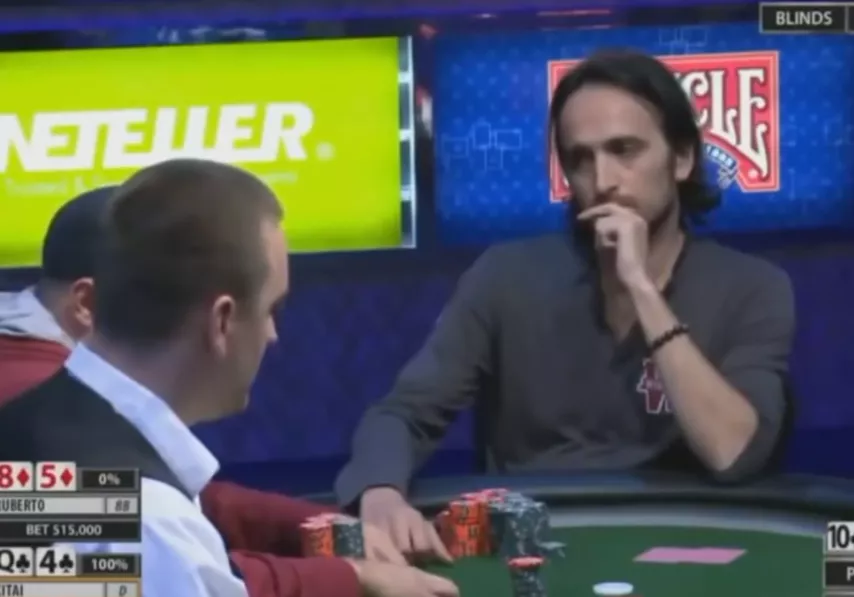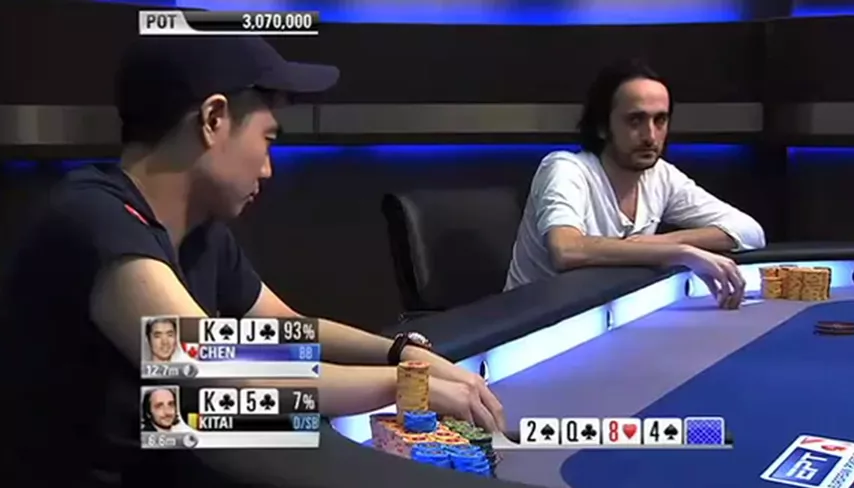Belgian Davidi Kitai is the former GPI world number two (2015), winner of three World Series bracelets as well as the rare offline Triple Crown of WSOP, WPT and EPT victories. There have only been 10 such players in tournament poker history; the last was Mike “SirWatts” Watson last year. But even in the context of these offline masters, who are all able to adapt to very different fields, Kitai stands out for his phenomenally bold and often successful reads. “I’m not the last person to play tells and I consider that to be my strength,” Charlie Carrell said in a recent video, “but the best hero call in poker history was of course made by Davidi Kitai.”
We'll take a look at a few hands where the Belgian live pro showed insight into levelling, including, of course, the game-changing hand at EPT Berlin heads-up play that impressed more than just Charlie Carrell.
WSOP 2014, NLHE $3000, 6-Max
Blinds 25k/50k, ante 5k. Final table. Kitai receives on the button and limps. Online reg Gordon Vayo calls from the small blind, offline grinder Anthony Ruberto checks in the BB with .
Flop (165k):
After a Vayo check, Ruberto fires a 95k lead. Kitai calls, Vayo folds.
Turn (355k):
Ruberto bets 195k.

Kitai calls with a gutshot and a flush draw.
River (745k):
"I can't imagine this hand ending in two checks. Action awaits!" World Series commentator David Tuchman anticipates.
Ruberto looks at his chips and then puts down a dark green stack of 25,000, sprinkled with a couple of cheaper chips: 515,000.
Kitai adopts a picturesquely thoughtful look and then stares at his opponent.


It only takes a few seconds for you to decide to pay.
— Eight high — says Ruberto. Kitai silently turns over the cards and Ruberto shakes his head, defeated by a hand only slightly better.
- Increased first deposit bonus
- Increased rakeback and reloads
- Help with deposits and cashouts
- Access to private freerolls
- Round-the-clock support
WSOP 2014, NLHE $3000, 6-Max
Blinds 40k/80k, ante 10k. Heads-Up. Vayo limps from the small blind . Kitai receives in the BB and goes up to 190k. What a payout.
Flop (400k):
Kitai makes a small bet of 95,000.
— Vayo has an open straight again — Tuchman says —. He was out of position last time and played his hand passively. What happens now?
Vayo pays quickly.
Turn (590k):
Kitai supplies the second barrel: 140,000. Vayo pays.
River (870k):
The draw closes, but not the right one. Both flush draws also fail. Kitai quickly checks. Vayo, after some thought, bets 320,000, pretending to represent fine value.

Once again, it seems that Kitai is first thinking about the situation in the abstract and then starts to “hit” his opponent. This time the call takes a little longer. Kitai picks up a whole stack of chips to call and starts rattling them, staring intently into his opponent’s face. After a bit of rattling, he relaxes and loosens his fingers, letting the chips fall onto the table.

— Remember, everyone: if you find yourself in a pot with Davidi Kitai, don’t bluff! — Tuchman warns the audience.

Heads-Up from EPT Berlin 2012
Blinds 80k/160k, ante 40k. Player stacks are 8.4 million for Kitai, 14.2 million for Canadian Andrew Chen. Kitai receives and raises to 350k. Chen 3-bets with at 900k. Kitai pays.

— Pay attention to how Kitai sits at the table — Charlie Carrell notes —. By slightly covering your eyes with your hand on your forehead, it is much more convenient to follow your opponent's reactions, because it is much more difficult to notice where your gaze is directed.
Flop (1.84 million):
—Both of them failed to connect with the flop, and after Chen inevitably c-bet around 850,000, the pot will go to him — commentator Remko Rinkema says confidently.
Chen bets a little less, 615,000, and Kitai, with all his backdoors, makes a very quick call.
— A call, wow! Let's hope he has a plan for the hand and doesn't think his weak king is the best hand. Well, Chen should already know that Kitai usually floats. I'm sure he'll bet the second barrel on many turns.
Turn:

Chen bets 1,480,000, roughly half the pot. Kitai thinks he only has 6.6 million behind him. However, another call follows.
— It will be fun if Chen bets on the river as a bluff and a worse hand calls! — another commentator anticipates.
River (6.03 million, effective stack 5.1 million):
— Oh... There's no chance of Kitai folding, because even before the river he clearly believed he had the best hand.
Chen goes all-in.

Kitai studies his opponent for a long time, then checks the cards, as he usually does before a fold, but immediately changes position and thinks again. Chen sits in the same position all this time and only blinks frequently.

This call takes Davidi more than two minutes: after all, the EPT champion title is at stake!
— Okay, call — Kitai says.
— Good call — Chen reacts immediately, showing his opponent his cards by throwing them on the table.

Ilya Gorodetsky recalls:
— I remember well that I commentated on this tournament live, and it was one of the first finals, which was broadcast with open cards and delay – at that time it was the latest fashion and a cool thing to know how to do :) In the first hour Kitai tried hard in everything, played very tight even in some limit situations, but when his opponents received information about his “strategy”, Davidi seemed to be replaced and played the next hour in a “monkey with a grenade” style – naturally, all 3-bet bluffs preflop and postflop paid off :)
Heads-Up from EPT Berlin 2012
And finally, Davidi Kitai's most famous hero call, which Charlie Carrell calls the best in history. Blinds 80k/160k, ante 40k. Andrew Chen gets and goes up to 350k. Kitai with pay.
Flop (760k):
After his opponent checks, Chen bets 330,000. Kitai calls.
Turn (1.42 million):
— It's not a good card to keep shooting, because it's much more suited to the BB range — says the commentator.
Both players pass fairly quickly.
River:

Kitai bets 550,000.
— It seems that he decided to turn his ace into a bluff! There are four cards in a row on the table, you can eliminate stronger hands: connections with a seven, a nine, and even a ten. Chen, in my opinion, will often check with medium value to the showdown on the turn — says Remko.
— Yes, his bet is aimed precisely at those hands. How can you call with a seven here? Unrealistic: to do so you would have to assume that Kitai floated on air.
— But Chen is thinking about it, and he is thinking, of course, about raising. He is quite capable of this and he already raised on the river as a bluff when he went all-in with ace high. Any raise from him... and Kitai will, of course, fold his cards.

Finally, Chen re-raises. His size is 1,565,000.
— Too much, in my opinion! There's no point in playing so big, because Kitai has a straight or a bluff — marvels the expert commentator —. Put in 1.2 or 1.3 million and you'll get the same effect.
— Perhaps this is intended to prevent Kitai from re-raising?
— Maybe. Of course, he can't go up one more time; that would be the craziest decision ever. And I really don't understand what Kitai is thinking. Why all this Hollywood? It's clear that he can't continue.

—But what if you're thinking of a hero call?
— That would be even weirder. He started the river with a bluff. He got a raise. So what? He suddenly started liking his hand?


— Wow! A fantastic call! This will be the highlight of the entire EPT season! — Remko Rinkema predicted, and apparently even played down the importance of it.

What goes on in Davidi Kitai’s head at such moments helps to understand the film “In the Head of a Pro”, filmed by the Winamax team at the 2022 World Series. To illustrate, we take a hand from the $10,000 6-max Championship in which Kitai tries to draw a hero call from his opponent. All the arguments below are in first person.


He folded on the button last round, he definitely won't fold two rounds in a row. His hand might be weaker than usual. Oh, I have an ace. Okay, call.
Flop:

He's been continuation betting 100% so far. He doesn't have much of an advantage on this flop.
Barack bets 45,000.
I have A-high and backdoor. I can call. Sometimes I have the best hand... and sometimes I don't.
Turn (200k):
Both pass.
It happened, that's good news.
River (200k):
One more repetition. An ace usually gives me the best hand. But I don't think he bluffs my check very often. Maybe I need to find it myself. I'll make a small block bet.

He can put me over a lot of lost hands: , , , , , . There are so many straight draws in my range that A-high is a pure draw. A player that good will call me with K-high and Q-high! And he won't be able to raise with an eight, since with an eight he would almost always continue on the turn. Yes, there are more eights in my range, but there are also a lot of bluffs. They just beat me. , , . Well, sometimes we share.
Kitai bets 40k. Barack calls and nods respectfully when he sees the ace: he didn't win on this hand.






















